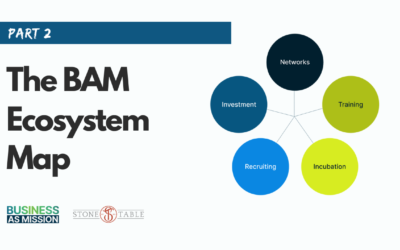B4T: What the Heart Looks Like

B4T: What the Heart Looks Like
When I think of B4T, my first question is, honestly, “What is that?”
Literally, I had zero idea what it was.
What is B4T?
B4T is shorthand for “Business for Transformation”; it is a mission that determines to share the gospel through a successful business venture that edifies the local community in which it is positioned. These businesses are typically, if not always, placed in communities that are deemed “unreached”, with little to no access to the gospel or consist of a population that does not know or worship Jesus. Patrick Lai, in his book “Business for Transformation”, gives us this more technical definition of B4T from its use in the context of the OPEN Network,
“[B4T is] businesses strategically placed in unreached areas that are profitable and serving the local community, generally through transformation, and specifically through evangelism, discipleship, and church planting.”
What this is, essentially, is a true business being planted in a community. Just as we would want to start a successful venture in our own home city, people that are living out B4T missions are also doing the same, but they are planting their roots in these unreached communities. The goal is not solely reaching lost souls for Jesus, and the goal is not solely a profitable business; it is both. It’s a fun paradoxical tension. The B4T practitioner is looking to live out the gospel of Jesus Christ by owning & operating a successful, profitable business in the context of a community that is edified by its presence there. They are looking to serve the needs and wants of the local population by creating a business to address those desires, and then using this business as a conduit for the love of Christ to flow to the local people. It is not merely a “platform” or a “front”, but it is a genuine, entrepreneurial construction with the goal of developing a flourishing, profitable business. This is B4T mechanics.
Got it? Okay. I feel like I wrote the same thing four different ways, so I hope one of them stuck. Next, we will examine the B4T picture in the light of mission work.
The Mission Field
When people think of missionary work, a lot of times they (we, being myself included) tend to think of some jolly Western volunteers coming to build some wells or dig some holes or set up a school for an impoverished community in Africa or Asia. We get there, we do something, we leave. Right? That’s a short-term mission in a lot of our minds. However, what makes B4T different is that it operates on a system that is based on a completely different paradigm. There is no “in & out” with B4T – this is a long term, rooted lifestyle. It’s more than just a strategy – this is a life venture that is committed to living among those who have never heard the gospel message. We look at B4T practitioners and see people that genuinely want to become part of a community. We see long-term relationships. We see people’s lives be shared with one another.
One of my all-time favorite verses in Scripture is 1 Thessalonians 2:8, where Paul writes, “consider B4T.”
Just kidding. Sorry, that was heresy for some of us.
Paul writes in 1 Thessalonians 2:8,
“So, being affectionately desirous of you, we were ready to share with you not only the gospel of God but also our own selves, because you had become very dear to us.”
Man, I love that verse. It just draws so much out of my heart.
I think about our pastor back home, who only spent two and a half years with us but spent those two and a half years bleeding with people. Crying with people. Loving with people. Celebrating with people. Sharing his life with us from the pulpit every Sunday so that we got to know who this dude was that kept preaching his guts out to us and stomping his feet on stage every week (y’know those Pentecostals…). He shared his stories from his past life, his home life, and his own failures and shortcomings. He showed us that he, too, needed the gospel of Jesus Christ and his vulnerability became evident to us so that we knew we could trust him.
Further, I think about one of my bosses from back home; a ludicrously intelligent man who spent every Monday through Thursday with patients in a Christian health care center and would pour out his own life experience into their stories and let them see what life looked like for him and his family. They would get a window into the life of the practitioner, which allowed them to break down the barriers of “this is the ideal person” and step over into the field of “we’re both doing life together”.
This is a relating factor – a joining factor. It binds people together. It gives them insight into what really goes on and lets them see, like, “Hey, we’re really not so different. His life is crazy, too.”
Done among unreached people, this looks doesn’t look like a tourist passing through town. It shouldn’t look like a sloppy business venture that was thrown together quickly as an afterthought for a visa. It doesn’t mean that you get those heathens saved and get out. B4T means that you have fallen into such complete love and deep compassion for a people who has never heard the gospel before that you take your skills, whatever they are, and pour them into that community. You build a business, you start a family, you live in the community.
This is what Paul wrote about in 1 Thessalonians 2:8.
Paul loved the Thessalonian people – just like our pastor loved us and my boss loves his patients. They shared their personal lives with those around them, not just their work.
On that same token, though, Paul did work among them.
Tentmaker Ministries
Paul was a tentmaker. He was a guy that worked with leather, worked with his hands, and worked hard. In the beginning of Acts 18, Luke writes about Paul meeting Aquila & Priscilla; two people from Italy who had been kicked out of Rome due to the Roman emperor’s persecution of Jews. In verse 3 Luke writes of their interaction,
“and because he (Paul) was of the same trade he stayed with them and worked, for they were tentmakers by trade.” (Acts 18:3).
By this, we can see the evidence of Paul being a tentmaker, and we see that he also worked. He shared in the life and labor of Aquila and Priscilla, doing both ministry and work with them (Acts 18:3, 18, etc.) This is the essence of B4T, the essence of the tentmaker.
Of all people, Paul probably had the biggest excuse to not work or labor at all, except to preach the gospel. However, he chose to dig in and work alongside them, and he gives good reason for this in his writing in 1 Thessalonians.
Paul the tentmaker writes,
“[we urge you] … to aspire to live quietly, and to mind your own affairs, and to work with your hands, as we instructed you, so that you may walk properly before outsiders and be dependent on no one.” (1 Thessalonians 4:11-12).
Paul wrote of the necessity to “work with your hands” in order to “walk properly before outsiders”. This is an interesting concept when you think about it because the Thessalonian church lived in a culture of pagans and idol worshippers, and they were called to be set apart to God. It seems that their working in society and contributing to its success was one way that they were called to show this “proper living”; one way to be an example and to reach people for Christ. Alas, though time does not allow me to expand on this Scripture as I may like, now you can see the connection between work and witness.
A note about definitions: We define tentmaking as “Self-funded missions work by means of starting a business, freelancing, or taking a job.”
That means that B4T overlaps with, but it not always necessarily tentmaking. Many “tentmakers” take jobs with multinational corporations, and some “B4Ters” receive support from churches even though they are intent on being profitable enterprises.
B4T: the Core of the Apple
When you look at what the heart of a B4T practitioner really is; what their mission, sentiment, and passion is; you see something beautiful. The heart, the core, the central driving force of a B4T practitioner is the gospel of Jesus Christ. It is the deep compassion for those who have not heard (Romans 10:14), it is the desire to love your neighbor as yourself (Mark 12:31), to be known as a disciple of Jesus by your love for people (John 13:35), and to serve the community; not seek to be served by them (Mark 10:45). This is what makes B4T so powerful. It is the love of Christ by the power of the Holy Spirit.
In that process, they seek to employ their entrepreneurial giftings to inhabit a local community for the effective witness and preaching of the gospel of Jesus Christ. They don’t come and go; they remain. They plant roots, get to know people, hire locals, and build their community up. They seek to transform the place in which they were planted.
These aren’t drifters – they are planters. They water seed and they sow it. They harvest seed and they grow it.
Running a business for transformation and operating in a B4T ministry is one example of what tentmaking looks like. We see its roots in Scripture, and we see the heart of B4T in the life of Paul. He chose to work among the people, live with them, and do life with them, sharing from his heart both the gospel and his profitable labors. This is B4T.
For more on Business as Mission (BAM), Business for Transformation (B4T), or their related terms, click here.
If you’re interested in learning how you can become a B4Ter, we want to encourage you to GO! You can sign up to intern with existing businesses or learn about joining a missions team.





